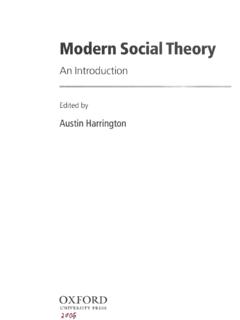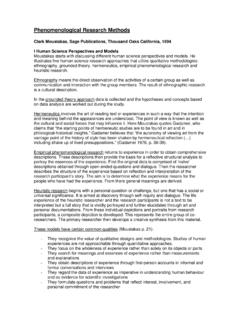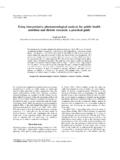Transcription of Husserl: The Idea of Phenomenology The Hyper-Paraphrase ...
1 1 Husserl: The Idea of Phenomenology The Hyper-Paraphrase series of philosophical texts Volume One By Seiji TAKEDA 2 | Contents Preface The ideas behind the 'The Idea of Phenomenology ' The Course of the Five Lectures in Outline hyper -Paraphrases: LECTURE I 1. The natural attitude in thinking and science of the natural sort 2. The philosophic (reflective) attitude in thinking 3. The contradictions of reflection on cognition, when one reflects in the natural attitude 4. The dual task of true criticism of cognition 5.
2 True criticism of cognition as Phenomenology of cognition 6. The new dimension belonging to philosophy; its peculiar method in contrast to science General Commentary LECTURE II 1. The beginning of the critique of cognition: Treating as questionable every knowing 2. Reaching the ground of absolute certainty in pursuance of Descartes' method of doubt 3. The things that are absolutely given 4. Review and amplification: refutation of the argument against the possibility of a critique of cognition 5. The riddle of natural cognition: transcendence 6.
3 Distinction between the two concepts of immanence and transcendence 7. The initial problem of the critique of cognition: the possibility of transcendent cognition 8. The principle of epistemological reduction General Commentary LECTURE III 1. The carrying out of the epistemological reduction: bracketing everything transcendent. 2. Theme of the investigation: the pure phenomenon. 3. The question of the "objective validity" of absolute phenomenon. 4. The impossibility of limiting ourselves to singular data: phenomenological cognition as cognition of essences.
4 5. Two senses of the concept of the a priori. General Commentary LECTURE IV 1. Extension of the sphere of investigation through a consideration of intentionality 2. The self-givenness of the universal: the philosophical method of the analysis of essence. 3. Critique of the interpretation of evidence as feelings: Evidence as self-givenness 4. No limitation on the sphere of genuine immanence: the theme of all self-givenness. General Commentary LECTURE V 3 1. The cognition of time- consciousness 2.
5 Apprehension of essences as an evident givenness of essence: the constitution of the individual essence and of the consciousness of universality 3. Categorical date 4. The symbolically thought as such 5. The field of research in its widest extent: The constitution of different modes of objectivity in cognition : The problem of the correlation of cognition and the object of cognition General Commentary Closing Essay: Phenomenological Reduction and the Condition for Belief Formation 4 Preface It is, typically, difficult for common readers to read and to understand philosophical texts unaided.
6 Apart from difficulties arising from translations of original texts into a foreign language, from Greek, say, or German, into Japa-nese, the fact is that most philosophical texts and commentaries on these texts are not targeted at common or inexpe-rienced readers. This means that a certain period of specific training is needed prior even to hoping to acquire a com-prehension of our great philosophical texts . It is somehow like reading musical notation. Before one can hear the score, one needs to undergo some degree of more or less professional training and to learn a specialized language.
7 On average, a continuous effort entailing three to five years of study is necessary properly to grasp philosophical texts . Taking short cuts, such as focusing on particular key terms and ignoring how these are arrived at, is always unsatis-factory and arbitrary. The aim of this Hyper-Paraphrase series to coin a title is, first and foremost, to save common readers the extra time and effort needed to reach a general understanding of Western philosophy, and, second, to dispense with the risk of an arbitrary understanding of philosophy, as mentioned above.
8 This series of specially summarized and contextualized guides to the most significant of our philosophical texts can be used as a handy tool towards understanding the content of the most important Western philosophical thought. I assure the reader that, by reading this book, he or she will need to devote only a few days to be able to grasp the es-sence - the big ideas - of a philosophy book that might otherwise occupy one for several months - if not years - compre-hensively to read through. Moreover, if the more specialist reader studies this book alongside the subject philosophical text itself, in its original language or in translation, he or see will, I believe, be better able to approach the core of the prime philosophy.
9 I hope this book is used in this second, adjunctive way, especially by the younger generation. The 20th century may be called the era of "anti-philosophy". Yet, ironically, more than any previous one, the current century is decisively in need of the essential principles and wisdom to be found in philosophy tracts. I there-fore hope to achieve two things with this book: to help the common reader who has had hitherto little to do with phi-losophy to find an easy way into the philosophies of our mainstream thinkers; and also to empower young people who in the past have experienced difficulty in studying philosophy to learn through this guide to come to understand phi-losophy, to overcome its abstruseness, and to use it as a helpful instrument to pave the way for their own future.
10 5 The ideas behind the 'The Idea of Phenomenology ' I should like here to give a relatively long explanation of the phenomenological method to help readers to gain an overall picture of what ' Phenomenology ' is. Husserl's text is well known for being abstruse; however, if one gets the point of his ideas at an initial stage of reading, one will, as one reads through it, be able to cope with his excessively complex way of argumentation. If the reader does not want to have much preliminary information, he or she may skip this general commentary and return to it at a later time.







